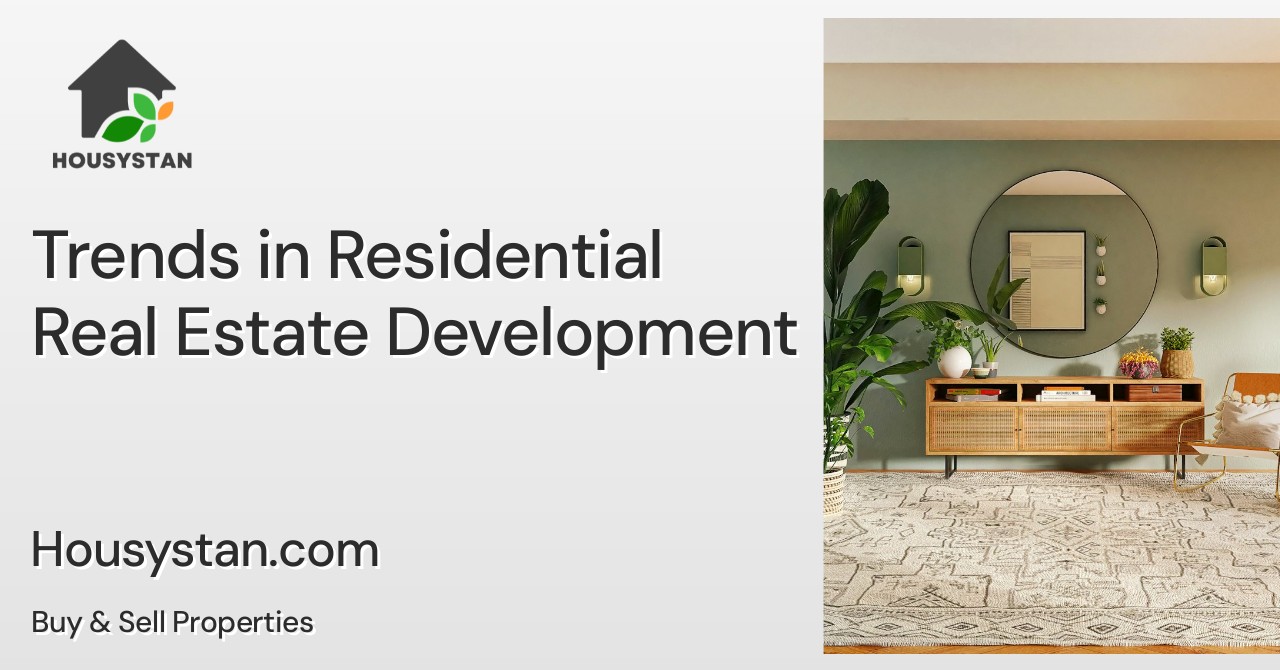Trends in Residential Real Estate Development
Read latest blogs and articles from Housystan

The Information mentioned here was last updated on:
29/1/2026Trends in Residential Real Estate Development: What to Expect in the Future
The residential real estate landscape has always been dynamic, shaped by economic forces, technological advancements, and evolving consumer preferences. In recent years, these factors have come together in unprecedented ways, leading to some interesting trends in residential real estate development. Here, we'll delve into the key trends that are shaping the future of home building and community planning — a must-read for anyone looking to understand the residential market better.
Sustainable and Eco-Friendly Construction
- Verified Tenants/Buyers
- Unlimited Property Listing
- Zero subscription/charges fee
Eco-Conscious Buyers and Builders
- Green Materials: Sustainable materials are becoming mainstream in housing projects. Builders are favoring bamboo flooring, recycled steel, and reclaimed wood. These materials are not only environmentally friendly but also boost the aesthetic appeal of homes.
- Energy Efficiency: Solar panels, energy-efficient windows, and high-grade insulation are regularly requested by homebuyers. Modern homes often include smart thermostats and light systems that help reduce energy consumption.
- Certifications Matter: LEED (Leadership in Energy and Environmental Design) and other certifications are increasingly sought by developers and buyers keen on sustainability.
Rise of Smart Homes
Integration of Technology in Living Spaces
- Home Automation: Today's buyers expect smart home features like voice-activated controls, automated lighting, and smart security systems. Technology integrated into residential spaces is not a luxury but a demand.
- IoT Devices: The Internet of Things (IoT) is transforming homes. From smart fridges to intelligent heating systems, connectivity is a core feature in modern residences.
- Future-Proofing: Developers are focusing on future-ready homes that can integrate upcoming technologies with ease.
Smaller, More Flexible Spaces
The Shift from Size to Purpose
- Micro-Living: As urban areas become denser, micro-apartments with multifunctional furniture provide a practical solution. These are popular in cities where space is scarce, and real estate prices are high.
- Open Floor Plans: Versatile, open floor plans remain popular. They provide the flexibility that modern families crave, allowing spaces to be adapted for various uses.
- Remote Work: With more people working from home, developers are designing residences with home offices or stylized nooks that cater to professional needs.
Suburban Transformation
A New Look at Suburban Living
- Urban-Suburban Hybrid: The lines between urban and suburban are blurring. Developers are introducing urban amenities into suburban settings, such as walkable communities, communal spaces, and local retail.
- Transport Connectivity: Improved transport links are making suburban areas more attractive. Proximity to commuter rails and highways enhances the value of these locations.
- Amenities and Lifestyle: Suburbs now offer lifestyle perks akin to urban centers, including fine dining, entertainment options, and cultural events, drawing buyers seeking balance between city and suburban life.
Affordable Housing Innovations
Bridging the Housing Gap
- Modular Homes: Prefabricated and modular construction processes allow for faster, cost-effective building. They are particularly beneficial in creating affordable housing quicker to meet high demand.
- Co-living Arrangements: Co-living is gaining traction as a viable affordable housing solution, especially in metropolitan areas. It combines independent living with communal facilities.
- Incentive Programs: Government initiatives aimed at making housing more affordable improve opportunities for development in less conventional markets.
Neighborhood Experiments
Creating Vibrant and Diverse Communities
- Mixed-Use Developments: These include residential units alongside retail, office spaces, and recreational facilities. Such diversity fosters community interaction and supports local economies.
- Walkable Communities: Areas designed for pedestrians, limiting car usage, are appealing for their health and environmental benefits. They also support local businesses and create vibrant street life.
- Community Gardens and Spaces: Integrating green spaces within neighborhoods not only enhances aesthetic appeal but also encourages community building.
Focus on Health and Wellness
Wellness-Driven Home Design
- Biophilic Design: This design approach uses natural materials, light, and vegetation to promote well-being. Features might include large windows for natural light and indoor gardens.
- Fitness Amenities: On-site fitness centers, yoga studios, and wellness retreats are increasingly popular in new developments, reflecting the growing health consciousness among buyers.
- Clean Air and Water: Advanced filtration systems are becoming standards in residential properties, ensuring inhabitants have access to clean air and water.
Conclusion
The trends shaping residential real estate development indicate a future where homes are more efficient, flexible, and integrated into vibrant communities. Prospective homebuyers, real estate professionals, and developers must keep an eye on these evolving trends to stay ahead in an ever-changing market. Each trend reflects deep shifts in societal values and technological progress, ensuring that the way we live continues to be exciting and diverse. As these trends mature, they will continue to redefine our notion of home and community, setting the stage for future innovations in residential real estate.
For more insights on real estate trends and development tips, consider exploring related topics on our blog.